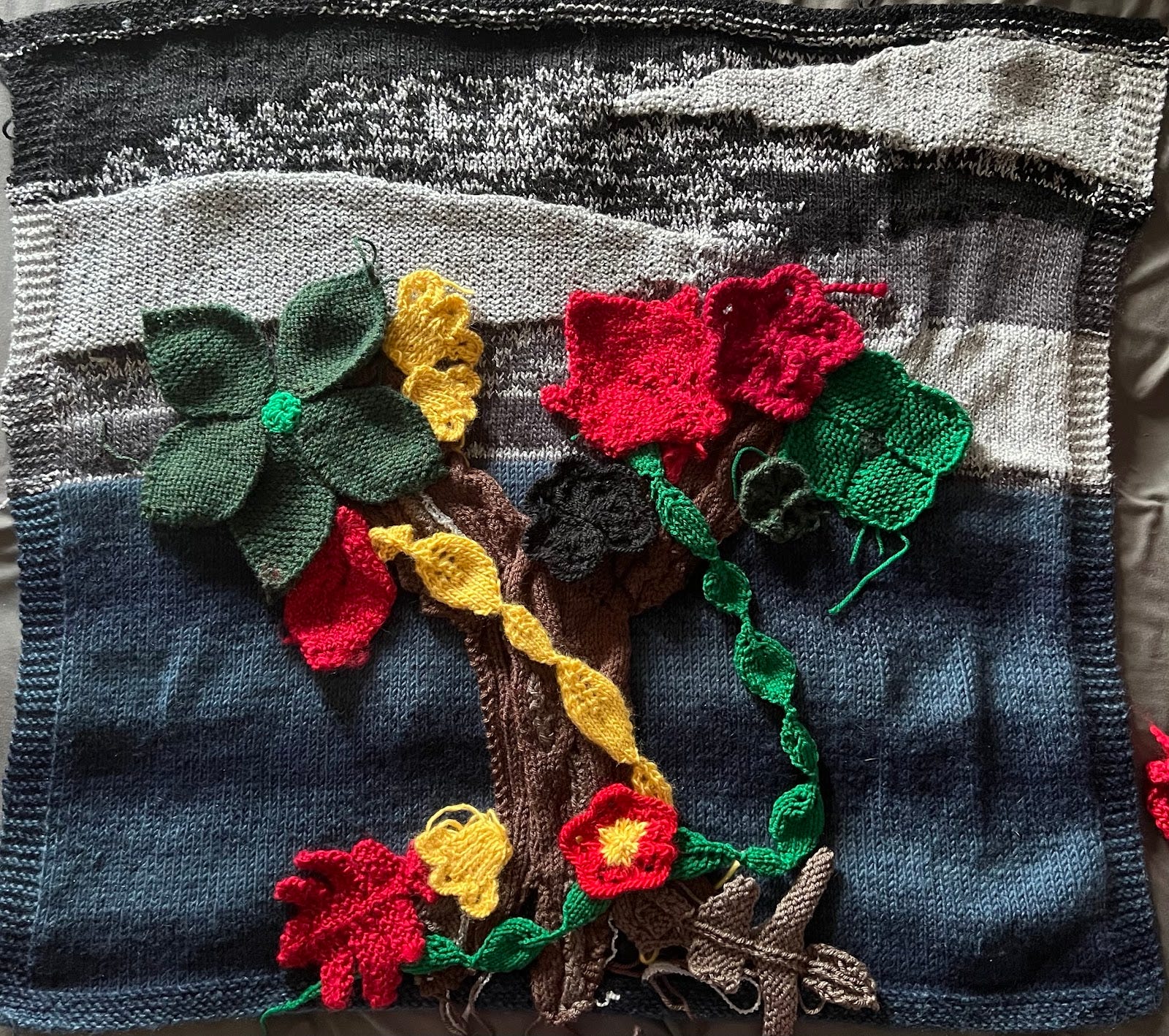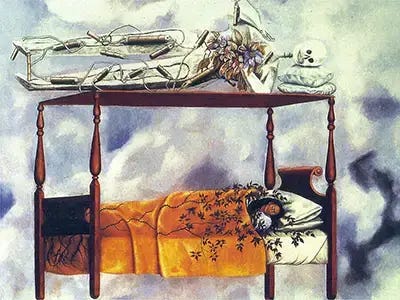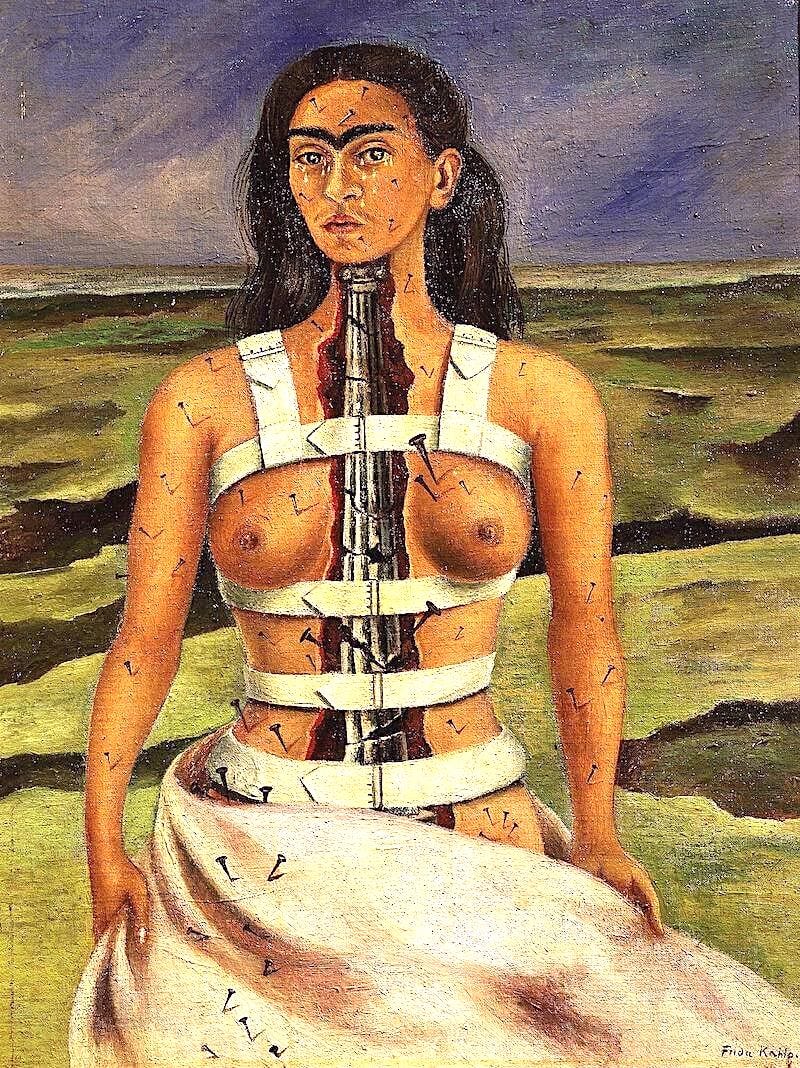Mercurial Introspection
Reflections on U.S. healthcare, women's health, and ableism

Rest has been the theme of this Mercury retrograde. I have been resting my mind of studious activities. This has included tarot and astrology. Instead I am focused on creative pursuits. I am knitting. I am writing a story based on my birth chart with the help of Alice Sparkly Kat’s Star Kids Club, building a character based on my natal placement of Mercury in Pisces, 5th house. The meditation of knitting and playful birth chart analysis has elicited reflections of resurfaced memories and experiences.
***Content disclosure: This week I chose to write about my experience working in the U.S. healthcare system. This post is graphic as I discuss my ICU nursing experience. This is my perspective as a cisgender, Korean/white, queer woman in a heteronormative relationship. The perspective of a neurodivergent person who grew up in the rural, poor areas of a flyover state in the 1980s/90s. I apologize if I offend anyone as I discuss ableism as someone who has not experienced a physical disability.
My last NP grad course was about women’s health. I am truly shocked by how little we know about women’s health. Our textbook often cited the SWAN study— Study of Women’s Health Across the Nation. Since 1994, SWAN has studied a cohort of white, African-American, Hispanic, Chinese, and Japanese women, 48% being white, who can read and write English, Spanish, Chinese, or Japanese, and reside within a certain distance from seven different cities, the majority of them on the east or west coast and college communities.
My initial reaction to SWAN was exclusion. It brought back my childhood memories of being asked if I was Japanese or Chinese and then puzzled faces when I said Korean. Where is the representation for rural women? The women who can’t read or write? Criteria for the study included having an intact uterus and one functioning ovary. What about the rest of the women? Where is their long-term study? What about the women before 1994? What medieval bullshit did their healthcare providers believe in? It was very triggering and a reminder not to build too much trust in the U.S. healthcare system. It is practicing medicine and practice only makes perfect if you want to improve.
One of my favorite shows, Golden Girls covered this issue in 1989, season 5, episode 1 and 2. There is something so comforting about a Dorothy Zbornak monologue. Watch her expertly confront her smug doctor.
Honestly not much has changed in 34 years. My ICU nursing experience has colored my perspective. If you can breath on your own and maintain your hemodynamics, you are not sick. Nurses often joke that their kids needs to have a severed limb before they take their complaints seriously. I recently read the book Disability Visibility which has changed my perspective and revealed my ableism. I have often said I would rather die than go through the experience of being an ICU patient. In a late-night morbid game, my coworkers and I debate whether we would rather have a stroke or a myocardial infarction. Oh, the MI for sure. Stroke out and you lose your independence.
After reading this book, I cringe at many of our conversations, but it is a coping mechanism against the horrors we bear witness to. Hearing and feeling all the ribs crack as you pump on the chest of an 80-year-old woman with metastasized cancer and 10 other comorbidities. Their family pleading in the hall to keep them alive so they can see a distant relative. Her great-nephew is taking a flight from Las Vegas tomorrow. Just one more day….
The guilt of being the last person to talk to the patient before the endotracheal tube is placed. Promising them it will just be for a ‘little bit.’ When you know it’s a lie, the guilt hits harder. A little bit turns into a tracheostomy or worse. Sometimes there is nothing else we can do to subvert death.

I have a 38-year-old breast cancer patient who still haunts me. The night she was my patient, her husband was home with their 3 children, unable to find childcare. They were all under the age of 10. COVID was starting to ramp up, but her status was so tenuous, her family was welcomed to stay with her. She didn’t want her kids to witness the severity of her illness. I held her hand and told her it was going to be OK as the anesthesiologist drifted her to sleep and slid a plastic tube in her throat. The last thing she said was “I just feel weird.” Her husband finally made it to the hospital by 6 am, one hour before my shift was done. He asked me if he could take his mask off to kiss her. My heart broke into a billion pieces. She died later that day.
I have worked in healthcare for 20 years. I have so many of these stories I don’t know how my heart is still together. Maybe it doesn’t crack all at once and a tiny piece just shakes loose, withers in your chest. The gallows humor of my colleagues may seem morbid or crass, but that is also the nature of our jobs. I once saw a patient expel feces 6 feet across the room. He had a severe bowel obstruction and when we turned him, the floodgate opened. I have had patients eat feces. I have had patients try to urinate on me. I have had patients look me in the eye and threaten to murder me. They read my name on my ID badge and say they will find me. Humor is how we cope, but I want to make sure I never lose my empathy for my patients.
After reading Disability Visibility, I have realized that my ableism is part of capitalism and individualism. If society provided the required resources all disabled individuals would be able to live more fully. All parts of the world should be accessible for everyone. This is an intricate, delicate topic and I am just beginning to explore it. Seems fucking crazy as I have worked in healthcare for so long. Alice Wong is the founder of the Disability Visibility Project and editor of this book. She wrote an amazing essay that encapsulates the experience of being an ICU patient, caught in the capitalistic healthcare vortex.

I never want to be that smug healthcare provider who does not listen to my patients. We are taught to follow evidence-based practices, but what if the evidence is biased? So much of modern medicine is based on the white, cisgender male body. I have felt like Dorothy before. I remember asking my doctor for a birth control pill that would not make me emotionally labile. He said he never heard of that before and I need to get more exercise. I was bulimic and exercising 3 hours a day at that time. There was no way in hell I was going to tell him anything again after he just looked at me like I had 3 heads. For several years, I stopped seeking routine preventative care after that experience.
My women’s health clinical site was in a rural town with a population around 3,600. Food sources are one grocery store, open till 6 pm and closed on Sundays, and gas station or fast food. There is one pharmacy, open from 10 am to 4 pm, which does not accept insurance or dispense controlled substances. The largest employer is a medium security prison. It is an actively dying town. It used to have a vibrant shopping center and multiple healthcare clinics, but they have all shut down over the past 3 years. The residents need to travel 40 miles to obtain many of their basic needs. What if you do not have a car? What if you are unhoused in a small town? In my clinical experience, this means your health and quality of life suffers.
My patient encounters included a woman residing in a motel, being exploited by the owner for labor. She is expected to accept phone calls and tasks from the owner, regardless of time of day, or she will be asked to leave the motel. The owner called during the appointment. Another woman had finally moved into her own apartment after leaving an abusive relationship, but she still did not have a car. She was still unemployed and at risk of losing her benefits. Wisconsin requires people to work if they are not disabled. Lack of transportation is an exemption, but this woman was told she should be able to walk to work as the town she lives in is small. If you have ever experienced a Wisconsin winter, you are aware of its brutality. Public transportation is rare in a small town.
It is so frustrating participating in a dysfunctional system. I can’t help but feel like I am contributing by staying employed in healthcare. I work for a wealthy, world renowned healthcare organization and they perpetuate an ableist agenda. I cannot disclose my employer as I fear termination and possible difficulty in advancing my degree. I am trapped by the money. I get paid very well and am able to work part time to pursue grad school.
I find some solace in the 1998 movie SLC Punk. It’s outdated and may be viewed as problematic in our current culture, but it also feels very 80s/90s. I grew up bombarded by problematic messages and it is probably why I am now just starting to educate myself about disability justice. I am not the perfect healthcare provider, but I am practicing to improve myself. Steve-o says ‘we can do a hell of a lot more damage in the system than outside of it.’ Maybe there is some truth to that. Maybe I can do some internal damage.
